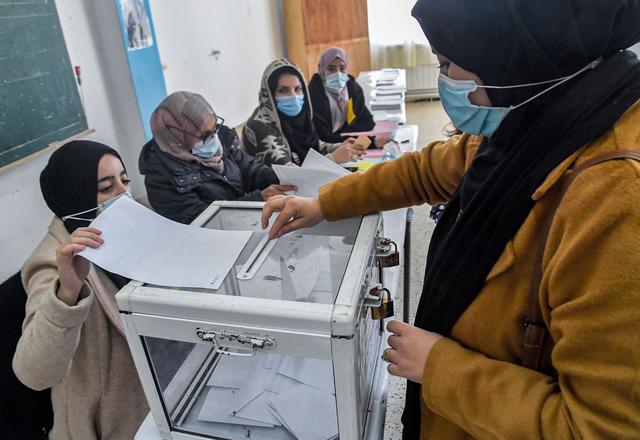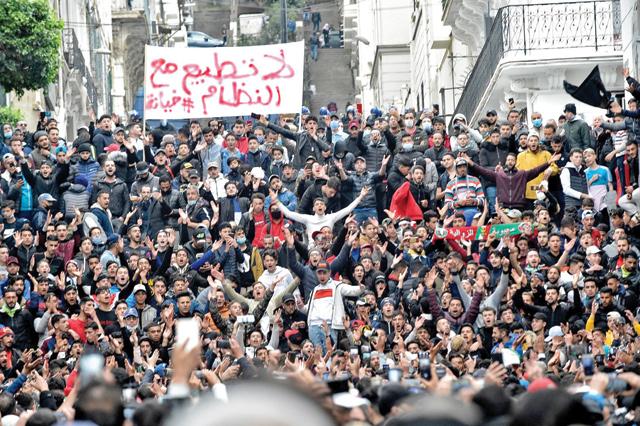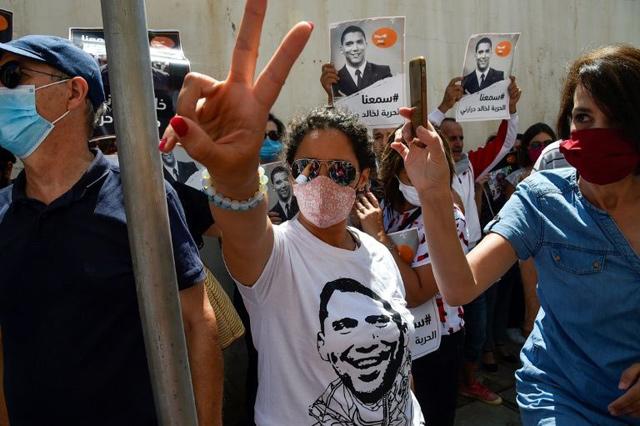You are here
Algerians vote in local polls to seal post-Bouteflika 'change'
By AFP - Nov 28,2021 - Last updated at Nov 28,2021

A woman casts her ballot while voting in the Algerian local elections at a polling station in the capital Algiers on Saturday (AFP photo)
ALGIERS — Algerians voted Saturday in local elections seen as key in President Abdelmadjid Tebboune's push to turn the page on the two-decade rule of late president Abdelaziz Bouteflika.
But despite official campaigns urging Algerians to "make their mark", the vote for municipal and provincial councils sparked little public interest.
The election is the third vote in Algeria under Tebboune, who has vowed to reform state institutions inherited from Bouteflika, an autocrat who ruled the country for two decades.
Observers are predicting a low turnout, in the same manner as the other poorly-attended elections held since Bouteflika was driven from power by the Hirak pro-democracy protest movement in April 2019.
Two hours into the vote, turnout was running at about four per cent, the election authority ANIE said.
The North African country's rulers are trying to "impose their will despite the embarrassing results of previous elections", said analyst Mohamed Hennad.
Polling stations opened at 8:00 am (0700 GMT) and were scheduled to close at 7:00 pm.
More than 23 million people are eligible to vote, with 115,230 candidates standing for municipal and provincial councils.
Results are expected on Sunday.
Tebboune, members of his family as well as the army's chief of staff and other government officials were among the first to vote.
Campaigning had been muted despite calls by authorities on Algerians to take part if they "want change" and "institution building".
But Omar, an engineer, said he would not cast a ballot.
"Nothing will change," he said.
Yacine, a teacher, said he would be voting for rivals of the current Algiers mayor "even if I have no illusions" that they will be better.
Tebboune was elected in a contentious, widely boycotted 2019 ballot months after Bouteflika stepped down under pressure from the army and Hirak rallies.
He has vowed to break with the past manner of holding local and regional elections marred by widespread claims of fraud, as they were in the era of Bouteflika, who died in September at the age of 84.
In a televised interview on Friday, Tebboune, a former prime minister under the late autocrat, called on Algerians to participate in large numbers in the vote.
“If the people want change, it is time they do something about it themselves by voting,” he said.
Algeria’s local assemblies elect two-thirds of members of the national parliament’s upper house, with the president appointing the remainder.
Redouane Boudjemaa, a journalism professor at the University of Algiers, said the vote was simply “an attempt to clean up the facade of local councils by changing their members, to benefit the ruling class”, he said.
“Politics at the moment is limited to slogans proclaiming that the country has entered a new era, while all indicators point to the contrary,” Boudjemaa added.
‘No vision’
Tebboune pushed through an amended constitution in November 2020, approved by less than 24 per cent of the electorate, and oversaw a parliamentary election that saw just 23 per cent of voters take part.
His rule has seen a crackdown on journalists and Hirak activists, even as he has packaged major policy moves in response to calls by the protest movement for reform.
He has also faced one diplomatic crisis with Algeria’s ex-colonial ruler France, and is embroiled in another with neighbouring Morocco.
Algiers severed diplomatic ties with Rabat in August over the disputed territory of Western Sahara.
Boudjemaa said the main issue at stake was the “huge economic and social challenges of the coming year”.
“Several indicators show that the pouvoir [ruling elite] has neither the vision nor the strategy to respond to the crisis,” he said.
Hennad, the analyst, said that the elite, in power since Algeria’s independence from France in 1962, was using slogans around change to impose its agenda without truly engaging other political forces.
Despite a declared boycott by the opposition Rally for Culture and Democracy, party activists stood on independent lists.
Related Articles
ALGIERS — Thousands of Algerians marched on Monday in the capital and other cities to mark the second anniversary of the North African natio
ALGIERS — President Emmanuel Macron starts a three-day visit on Thursday to Algeria to help mend ties with the former French colony, which t
ALGIERS — For over a year Algeria's defiant anti-government "Hirak" protestors seemed unstoppable, but weekly demonstrations skidded to a ha














